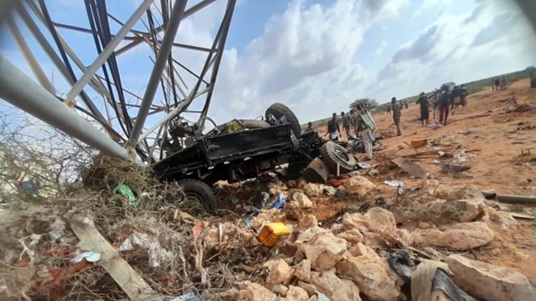More than a dozen bombings in and around Somalia’s capital, Mogadishu, in November and December 2023 revealed a clear pattern — telecommunications company Hormuud Telecom was being targeted. Bombs killed at least three employees and destroyed offices, communications towers and vehicles.

Analysts believe al-Shabaab has targeted the country’s largest telecommunications provider for refusing to pay “taxes” to the terrorist group.
“I presume this was because they did not want to pay taxes,” Jarle Stig Hansen, a Norwegian academic, told The Africa Report magazine. “It’s becoming tougher for al-Shabaab, but this battle over taxes in Mogadishu hasn’t finished yet. It depends on how many bombs al-Shabaab can deploy against big business corporations inside Mogadishu.”
In 2022, the Somali government began to focus on dismantling al-Shabaab’s vast streams of revenue and found some success by blocking bank accounts and mobile phones connected to the group. But the al-Qaida-linked terrorists continue to fund their attacks by demanding zakat (annual and monthly religious taxes) in cash, laundering money through international gold purchases, and using threats and violence to intimidate bankers.
Matt Bryden, a security expert and strategic advisor at the Kenya-based Sahan Foundation think tank, said Somalia is facing an uphill battle.
“There is a genuine, robust tax base,” he told The Africa Report. “You can call it extortion, you can call it what you want. But it’s there, it’s real, and it works. They may just rely more on keeping the cash in the regions, or having merchants pay them in kind, so they don’t have to move so much cash around. They’re highly adaptable and their financial base is much larger than a couple of hundred accounts in the bank in Mogadishu.”
One of the world’s richest militant groups, al-Shabaab generates between $100 million to $150 million a year through extortion, taxing local businesses and individuals, facilitating illicit trade, and collecting fees on goods at road checkpoints and ports in its territory. Al-Shabaab controls large swathes of the center and south of the country, where agriculture drives steady commerce.
A Somali electronic banking expert who asked not to be identified said banks face a double-edged sword because they need business from the militant group. They are willing to work around the regulations that the government put in place in 2022.
“Banks have frozen the money in the banking accounts, but banks are allowing them to take out money more easily, as they don’t want them to leave the bank,” the expert told The Africa Report. “They have talked to the leader of the bank, and he doesn’t want to lose his business. They are putting pressure on bank managers to release the [frozen] funds.”
The expert also said the government has taken steps to stop the practice, requiring cameras in Mogadishu’s Bakaaraha market to curtail extortion. But the Amniyat, al-Shabaab’s secret security and intelligence wing that collects and handles the group’s finances, simply pivoted to demanding cash.
Yahya Hagi Ibrahim, a Mogadishu-based academic, says the government’s best chance of cutting into al-Shabaab’s revenue is to empower people to stop paying zakat.
“Civil society is mobilized against them,” he told The Africa Report. “When they see them, they go to the police station. It is a rich organization, but their wealth is declining. Nomads are refusing to pay zakat, and they cannot enforce it.”
Ibrahim said he is confident that “the government is squeezing them. Somali intelligence has infiltrated them. The government is arresting people from al-Shabaab controlled areas.”
Source: ADF

Leave a Reply